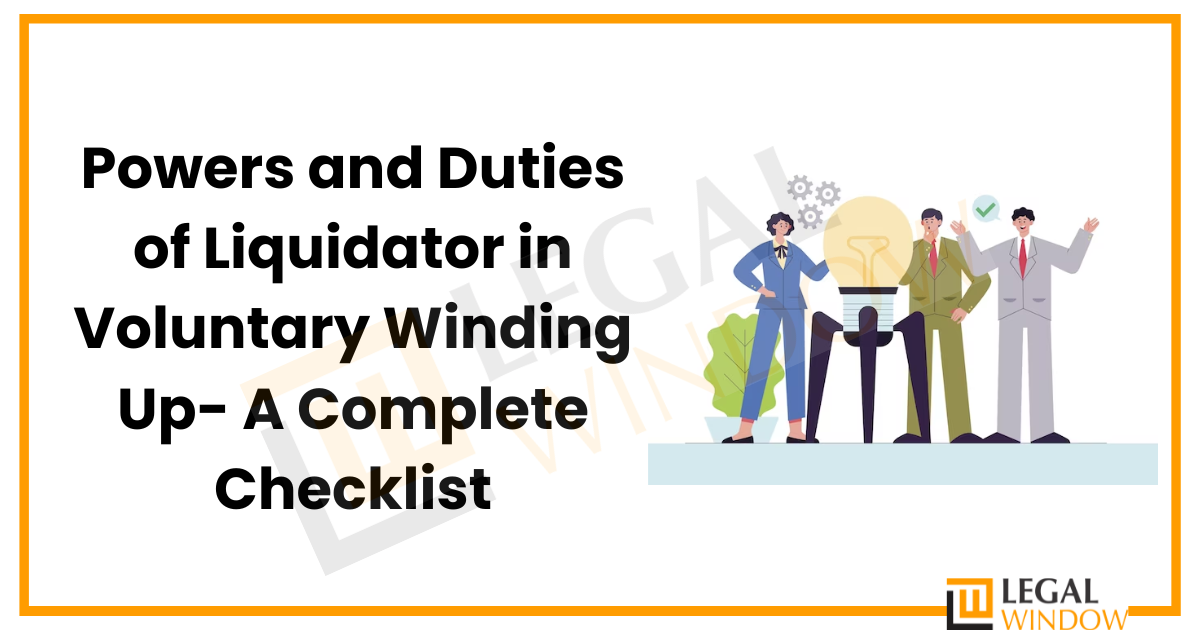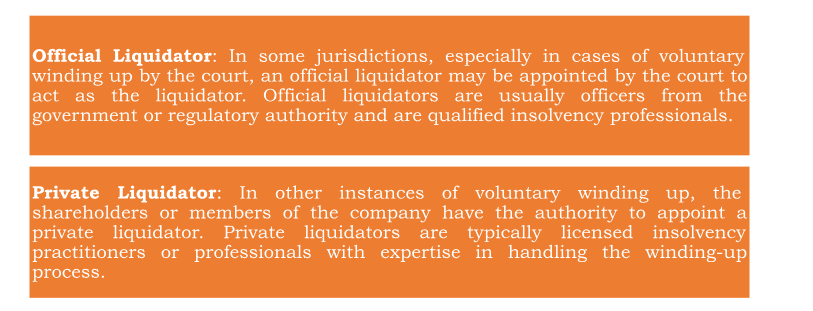Powers and Duties of Liquidator in Voluntary Winding Up- A Complete Checklist
- August 21, 2023
- Change in Business

In voluntary winding up, when a company decides to close down its operations, a liquidator is appointed to oversee the process. But what exactly does a liquidator do? The liquidator holds significant powers, including gathering and selling company assets, settling debts, and distributing remaining funds to shareholders. Moreover, they bear the responsibility of ensuring fair treatment to all parties involved and conducting investigations if any misconduct is suspected. Let us discuss the powers and duties of liquidator.
| Table of Contents |
Who is a Liquidator in Voluntary Winding Up?
In voluntary winding up, a liquidator is an individual appointed by the shareholders or members of a company to oversee the winding-up process and manage the affairs of the company during the period of its dissolution. The main purpose of the liquidator is to ensure the orderly and efficient realization of the company's assets, settlement of its liabilities, and fair distribution of any remaining funds to the shareholders or members.
The liquidator can be either:

Role of Liquidator
The role of liquidator of a company is to oversee the winding-up process and manage the affairs of the company during its dissolution. When a company goes into liquidation, either through voluntary or compulsory winding up, the liquidator is appointed to act as an independent and impartial representative of the company and its stakeholders.
Appointment and Qualifications of a Liquidator
In a voluntary winding-up, the company's shareholders must pass a special resolution to appoint a liquidator. The liquidator may be a qualified insolvency practitioner, a licensed individual, or even a shareholder or director of the company. However, some jurisdictions may require specific qualifications and restrictions for the appointment of a liquidator.
Now let us discuss some powers and duties of liquidator under Companies Act 2013.
Powers of the Liquidator
The powers of a liquidator include-
- Gathering and Realization of Assets: One of the primary duties of the liquidator is to identify and gather all the assets of the company. This includes tangible assets such as property, equipment, and inventory, as well as intangible assets like patents, trademarks, and intellectual property rights. The liquidator is then responsible for selling or disposing of these assets to convert them into cash.
- Settling Liabilities: The liquidator must also identify and settle all the outstanding debts and liabilities of the company. This includes payments to creditors, employees, and other stakeholders. The liquidator must follow a strict order of priority while making these settlements, as defined by the relevant laws.
- Distribution of Funds: Once the liabilities are settled, the liquidator distributes the remaining funds, if any, to the shareholders under their shareholdings. The order of distribution may also be specified by law, ensuring fair treatment to all shareholders.
- Investigations: The liquidator has the power to conduct investigations into the company's affairs to ascertain any wrongful trading or fraudulent activities that may have contributed to the company's insolvency. If any misconduct is discovered, the liquidator can take legal action against those responsible.
- Summoning Meetings: The liquidator can call for meetings with the creditors, contributors, or shareholders as required during the winding-up process. These meetings may be for obtaining approval for certain actions or to keep stakeholders informed about the progress of the winding-up process.
- Legal Action: The liquidator has the authority to initiate legal proceedings on behalf of the company to recover assets, challenge voidable transactions, or defend the company's interests.
Duties of the Liquidator
The liquidator has following duties namely-
- Fiduciary Duty: The liquidator acts as a fiduciary for the company and its stakeholders. They are required to act honestly, impartially, and in the best interests of all parties involved.
- Reporting: The liquidator must provide regular reports on the progress of the winding-up process to the relevant authorities and stakeholders. These reports may include financial statements, details of asset realization, and other relevant information.
- Compliance with Laws: The liquidator must comply with all relevant laws and regulations governing the winding-up process. They must ensure that the distribution of assets and settlement of liabilities follow the prescribed legal procedures.
- Impartiality: The liquidator must remain neutral and unbiased throughout the winding-up process, avoiding favoritism towards any stakeholder.
Final Words
The role of a liquidator in voluntary winding up is of paramount importance to ensure a smooth and fair distribution of the company's assets among its stakeholders. This checklist of powers and duties serves as a guide for liquidators to discharge their responsibilities effectively and in compliance with the applicable legal framework. Engaging a qualified and experienced liquidator can significantly contribute to a successful and expeditious winding-up process, benefiting all parties involved.
In case of any query regarding powers and duties of liquidator, a team of expert advisors from Legal Window is here to assist you at every step. Feel free to reach us at [email protected].
Company Secretary and diligent learner deeply immersed in the world of corporate law, compliance, and governance with a focus on developing a robust foundation in legal principles and corporate practices. Passionate about exploring the intricacies of company law, regulatory compliance, and corporate governance.
Categories
- Agreement Drafting (23)
- Annual Compliance (13)
- Change in Business (37)
- Company Law (150)
- Compliance (90)
- Digital Banking (3)
- Drug License (4)
- FEMA (17)
- Finance Company (42)
- Foreign Taxation (9)
- FSSAI License/Registration (15)
- GST (124)
- Hallmark Registration (1)
- Income Tax (214)
- Latest News (36)
- Miscellaneous (170)
- NBFC Registration (8)
- NGO (18)
- SEBI Registration (6)
- Section 8 Company (10)
- Start and manage a business (27)
- Startup/ Registration (134)
- Trademark Registration/IPR (48)
Recent Posts
- Major Upgrade: Breaking Down GST 2.0 September 15, 2025
- New Income Tax Bill 2025 August 27, 2025
- ITR-3 Form Explained: Who Should File & Step-by-Step E-Filing Guide (FY 2024-25) June 25, 2025
All Website Tags
About us
LegalWindow.in is a professional technology driven platform of multidisciplined experts like CA/CS/Lawyers spanning with an aim to provide concrete solution to individuals, start-ups and other business organisation by maximising their growth at an affordable cost.











